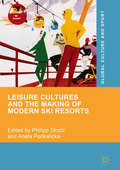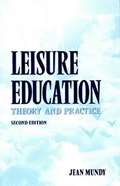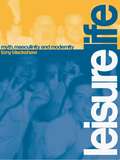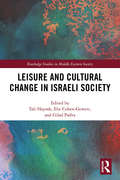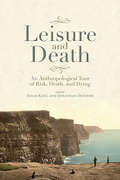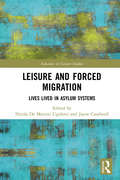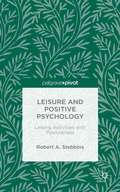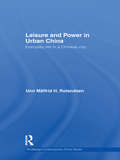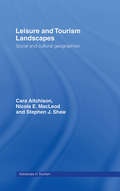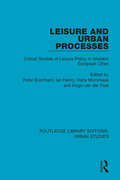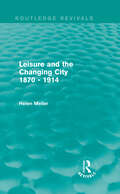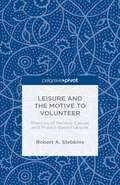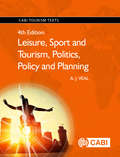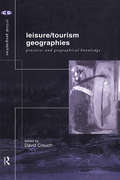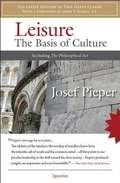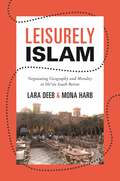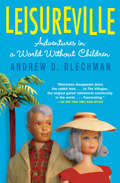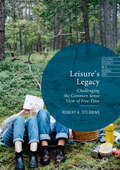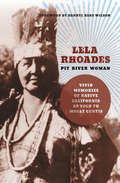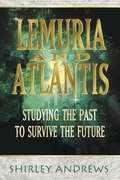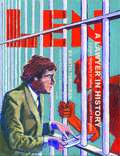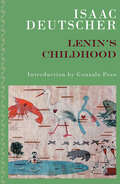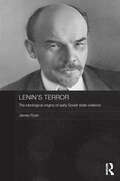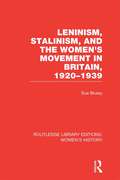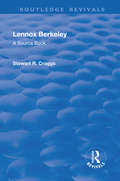- Table View
- List View
Leisure Cultures and the Making of Modern Ski Resorts (Global Culture and Sport Series)
by Philipp Strobl Aneta PodkalickaThis edited volume offers an historical perspective on the creation of a global mass industry around skiing. By focusing on the ski resort as loci par excellence for global exchange, the contributors consider the development of skiing around the world during the crucial post-war years. With its global lens, Leisure Cultures and the Making of Modern Ski Resorts highlights both commonalities and differences between countries. Experts across various fields of research cover developments across the ski-able world, from Europe, Asia and America to Australia. Attention to media and material cultures reveals an insight into global fashions, consumption and ski cultures, and the impact of mainstream media in the 1960s and 1970s. This global and interdisciplinary approach will appeal to history, sociology, cultural and media research scholars interested in a cultural history of skiing, as well as those with more broad interests in globalization, consumption research, and knowledge transfer.
Leisure Education: Theory and Practice
by Jean MundyLeisure Education presents a thought-provoking overview of leisure education-from philosophical considerations in leisure education theory to models and units that can be implemented in leisure education classes. The book provides practical information for individuals working with recreation and park agencies, therapeutic recreation facilities, correctional facilities, and ageing individuals.
Leisure Life: Myth, Modernity and Masculinity
by Tony BlackshawLeisure Life is a ground-breaking study of men and masculinity. Focusing on the social networks and leisure lifestyles of a particular group of working-class men - 'the lads' - Tony Blackshaw argues that traditional social collectivities such as class are being superseded. Instead, leisure life is now the central arena in which individuals assert their identities and confirm their belonging. For 'the lads', leisure time is the pivotal point in a fragmented life which not only allows them to fashion some sense of order in a world of endemic disorder but also provides opportunities for the assertion of their masculinity.The book uniquely combines 'the lads'' own raw and compelling accounts of their leisure experiences with a sophisticated interpretive analysis. In doing so, it draws on the work of major theorists such as Baudrillard, Derrida, Foucault, and especially Bauman to develop new critical insights into our understanding of the meaning of leisure.Leisure Life awakens the sociological imagination. It offers a new approach to the study of masculinity and the ethnography of leisure, making it appropriate for courses in sociology, leisure, cultural and gender studies.
Leisure and Cultural Change in Israeli Society (Routledge Studies in Middle Eastern Society)
by Elie Cohen-Gewerc Gilad Padva Tali HayoshProviding an inclusive, yet multi-layered perspective on leisure cultures in dynamic hegemonic, subcultural, and countercultural communities, this volume investigates the disciplinary and interdisciplinary aspects of leisure studies in the age of mass migration, nationalism, cultural wars, and conflicted societies in Israel. The Israeli society struggles with complicated geopolitical, intercultural, economic and security conditions since the establishment of the State of Israel. Consequently, the emergent leisure cultures in Israel are vibrant, diversified, exuberant and multifaceted, oscillating between Western and Middle Eastern tendencies. The chapters in this edited volume reflect dramatic influences of globalization on Israeli traditions, on one hand, and emergent local practices that reflect a communal quest of originality and authenticity, on the other hand. This book opens up a critical perspective on the tension between contested leisure cultures which are interconnected with spatial and temporal changes and interchanges. Examining leisure as a part of social, interethnic, physical, gendered and sexual changes, the volume is a key text for scholars and students interested in leisure culture, Israeli society, education, cultural and media studies and the Middle East.
Leisure and Death: An Anthropological Tour of Risk, Death, and Dying
by Adam Kaul and Jonathan SkinnerThis anthropological study examines the relationship between leisure and death, specifically how leisure practices are used to meditate upon—and mediate—life. Considering travelers who seek enjoyment but encounter death and dying, tourists who accidentally face their own mortality while vacationing, those who intentionally seek out pleasure activities that pertain to mortality and risk, and those who use everyday leisure practices like social media or dogwalking to cope with death, Leisure and Death delves into one of the most provocative subsets of contemporary cultural anthropology. These nuanced and well-developed ethnographic case studies deal with different and distinct examples of the intertwining of leisure and death. They challenge established conceptions of leisure and rethink the associations attached to the prospect of death. Chapters testify to encounters with death on a personal and scholarly level, exploring, for example, the Cliffs of Moher as not only one of the most popular tourist destinations in Ireland but one of the most well-known suicide destinations as well, and the estimated 30 million active posthumous Facebook profiles being repurposed through proxy users and transformed by continued engagement with the living. From the respectful to the fascinated, from the macabre to the morbid, contributors consider how people deliberately, or unexpectedly, negotiate the borderlands of the living. An engaging, timely book that explores how spaces of death can be transformed into spaces of leisure, Leisure and Death makes a significant contribution to the burgeoning interdisciplinary literature on leisure studies and dark tourism. This book will appeal to students, scholars, and laypeople interested in tourism studies, death studies, cultural studies, heritage studies, anthropology, sociology, and marketing. Contributors: Kathleen M. Adams, Michael Arnold, Jane Desmond, Keith Egan, Maribeth Erb, James Fernandez, Martin Gibbs, Rachel Horner-Brackett, Shingo Iitaka, Tamara Kohn, Patrick Laviolette, Ruth McManus, James Meese, Bjorn Nansen, Stravoula Pipyrou, Hannah Rumble, Cyril Schafer
Leisure and Forced Migration: Lives Lived in Asylum Systems (Advances in Leisure Studies)
by Nicola De Martini UgolottiThis book offers a timely and critical exploration of leisure and forced migration from multiple disciplinary perspectives, spanning sociology, gender studies, migration studies and anthropology. It engages with perspectives and experiences that unsettle and oppose dehumanising and infantilising binaries surrounding forced migrants in contemporary society. The book presents cutting edge research addressing three inter-related themes: spaces and temporalities; displaced bodies and intersecting inequalities; voices, praxis and (self)representation. Drawing on and expanding critical leisure studies perspectives on class, gender, sexuality and race/ethnicity, the book spotlights leisure and how it can interrogate and challenge dominant narratives, practices and assumptions on forced migration and lives lived in asylum systems. Furthermore, it contributes to current debates on the scope, relevance and aims of leisure studies within the present, unfolding global scenario. This is an important resource for students and scholars across leisure, sport, gender, sociology, anthropology and migration studies. It is also a valuable read for practitioners, advocates and community organisers addressing issues of forced migration and sanctuary.
Leisure and Positive Psychology: Linking Activities With Positiveness
by Robert StebbinsLeisure has a central role to play in positive psychology. From a leisure studies perspective, this book looks at how positive interpersonal relationships and positive emotional and cognitive states and processes are expressed or realized in myriad leisure activities. These activities, Leisure and Positive Psychology shows, are highly appealing, thereby providing their own motivational push. The more complicated of them, the serious pursuits, are, in turn, rooted in surrounding social worlds of people, groups, organizations, services, and a unique history. A powerful personal and social identity, this book argues, typically follows from involvement in these activities. Stebbins provides an in-depth investigation into themes such as flow, fulfilment, altruism, well-being, and interpersonal relationships
Leisure and Power in Urban China: Everyday life in a Chinese city (Routledge Contemporary China Series)
by Unn Målfrid RolandsenLeisure and Power in Urban China is the first comprehensive study of leisure activities in a medium size Chinese city. Hitherto, studies of Chinese leisure have focused on holidays, festivals and tourism. This, however, is a study of the kinds of leisure that take place on regular workdays in a local environment of Quanzhou city. In doing so, Leisure and Power introduces leisure studies to China studies, and data from China to the field of Leisure studies. Based on interviews with people from all walks of life and case studies from bookshops, internet bars, Karaoke parlours, streets and public squares, Rolandsen brings to attention the importance of fun and socializing in the lives of Chinese urbanites. Central to the study is the contrast between popular practices and official discourse. Rolandsen provides in-depth analyses of the moralist "PRC leisure ethic" so characteristic of official Chinese publications and news media. Using examples from everyday life as a contrast, this study demonstrates that official propaganda has but little influence on how Chinese individuals lead their lives. Taking leisure as a point of departure, this book describes the new kinds of interaction between the local party-state and the population it seeks to govern. This book will be of interest to students and scholars of Chinese Studies, Leisure Studies, Urban Studies and Asian Studies in general.
Leisure and Tourism Landscapes: Social and Cultural Geographies (Routledge Advances in Tourism #No.9)
by Cara Aitchison Nicola E. MacLeod Nicola E Macleod Stephen J. ShawIncreasingly significant as mediators of spatial identity and meaning, leisure, tourism, culture and heritage are only now beginning to be located within the rapidly evolving discourses of poststructuralist geographies. Exploring the influence of leisure and tourism on the production, representation and consumption of landscape, the first half of this important book focuses on different ways of ‘seeing’ or representing landscape, whereas the second half examines different forms of productive consumption in leisure and tourism. Both symbolic and material spaces of leisure and tourism are also examined in relation to urban and rural landscapes, heritage landscapes, gendered landscapes, and landscapes of sexuality and desire. With a multidisciplinary approach and a strong theoretical content which builds on poststructuralist theories, this is undoubtedly an important addition to literature in the field.
Leisure and Urban Processes: Critical Studies of Leisure Policy in Western European Cities (Routledge Library Editions: Urban Studies #4)
by Peter Bramham Ian Henry Hans Mommaas Hugo van der PoelFirst published in 1989. Focusing on leisure and policy in West European cities, this interdisciplinary study is written by leading policy analysts and academics from six European Community states: Belgium, France, Greece, Italy, the Netherlands, and the United Kingdom. The emergence of leisure as a significant area of public policy in both developed and developing economies has been recognised only relatively recently, and this book was the first to deal with urban leisure policy in a European context. Common themes in this study include the use of tourism as a strategic tool for the economic regeneration of cities, leisure as a vehicle of community development and of social integration, and the role of leisure in the development of socialist municipal policy programmes. This book should be of interest to policy makers in local government, lecturers and students of development, tourism, economics, and urban studies.
Leisure and the Changing City 1870 - 1914 (Routledge Revivals)
by Helen MellerBy the late nineteenth century, the city had become the dominant social environment of Britain, with the majority of the population living in large cities, often with over 100, 000 inhabitants. The central concern of this book, first published in 1976, is to assess how successful the late Victorians were in creating a stimulating social environment whilst these developing cities were being transformed into modern industrial and commercial centres. Using Bristol as a case study, Helen Meller analyses the new relationships brought about by mass urbanisation, between city and citizen, environment and society. The book considers a variety of important features of the Victorian city, in particular the development of the main cultural institutions, the provision of leisure facilities by voluntary societies and the expansion of activities such as music, sport and commercial entertainment. Comparative examples are drawn from other cities, which illustrate the common social and cultural values of an urbanised nation. This is a very interesting title, of great relevance to students and academics of town planning, Victorian society, and the history and development of the modern city.
Leisure and the Motive to Volunteer: Theories Of Serious, Casual, And Project-based Leisure
by Robert A. StebbinsVolunteering and its nonprofit organizations have commonly been analyzed in economic terms, with volunteering being referred to as "unpaid (productive) work". This economic definition has been around far longer than that of volunteering conceived of as leisure, which is discussed as the volitional definition. By means of a lengthy literature review, this book sets out the theoretical and empirical contributions of the serious leisure perspective to understanding volunteer motivation. This second approach began more than 40 years ago. It answers the key motivational question of why people engage in unpaid productive work, laborious or not. Since in this conception payment in cash or in kind is not an incentive to perform such work, what encourages people to volunteer? The serious leisure perspective, unlike mainstream economics, can shed considerable light on this question.
Leisure, Sport and Tourism, Politics, Policy and Planning 4th Edition
by A. J. VealA comprehensive, multi-disciplinary approach to public policy making and planning in the leisure, sport, and tourism sectors, this book provides an introduction to the subject for undergraduate and postgraduate students. It examines the theoretical issues underpinning public sector policy making such as political ideologies, leisure wants, needs, demand, and benefits, and human rights in leisure, sport, tourism, and culture. Also discussing the debates surrounding the role of the state versus market and the models of organizational decision-making, it uses applied sections addressing strategic planning and performance evaluation to provide a link between theory and practical analytical techniques.
Leisure/Tourism Geographies: Practices and Geographical Knowledge (Critical Geographies #Vol. 3)
by David CrouchLeisure and Tourism Geographies considers leisure/tourism as an encounter. An encounter that exists between people, between people and space and between people and their expectations, experiences and desires.The contributors explore diverse aspects of leisure and tourism, ranging from the methodologies behind leisure practices to detailed case studies including: *Disneyland, Paris*tourism in sacred landscapes*leisure practices in cyberspace*leisure and yachting*use of recreational/holiday cottages*National Parks, local parks and gardensPresenting an exciting mix of attitudes and ideas concerning leisure and tourism, this book documents a lively debate, placing geography at its centre.
Leisure: The Basis of Culture and The Philosophical Act
by Josef Pieper"One of the most important philosophy titles published in the twentieth century, Josef Pieper's Leisure, the Basis of Culture is more significant, even more crucial, today than it was when it first appeared more than fifty years ago. This special new edition now also includes his little work The Philosophical Act. Leisure is an attitude of the mind and a condition of the soul that fosters a capacity to perceive the reality of the world. Pieper shows that the Greeks and medieval Europeans, understood the great value and importance of leisure. He also points out that religion can be born only in leisure - a leisure that allows time for the contemplation of the nature of God. Leisure has been, and always will be, the first foundation of any culture. Pieper maintains that our bourgeois world of total labor has vanquished leisure, and issues a startling warning: Unless we regain the art of silence and insight, the ability for non-activity, unless we substitute true leisure for our hectic amusements, we will destroy our culture - and ourselves. "Pieper's message for us is plain. . . . The idolatry of the machine, the worship of mindless know-how, the infantile cult of youth and the common mind - all this points to our peculiar leadership in the drift toward the slave society. . . . Pieper's profound insights are impressive and even formidable. "- New York Times Book Review "Pieper has subjects involved in everyone's life; he has theses that are so counter to the prevailing trends as to be sensational; and he has a style that is memorably clear and direct. " - Chicago Tribune"
Leisurely Islam: Negotiating Geography and Morality in Shi‘ite South Beirut (Princeton Studies in Muslim Politics #49)
by Lara Deeb Mona HarbHow the rise of leisure is changing contemporary LebanonSouth Beirut has recently become a vibrant leisure destination with a plethora of cafés and restaurants that cater to the young, fashionable, and pious. What effects have these establishments had on the moral norms, spatial practices, and urban experiences of this Lebanese community? From the diverse voices of young Shi'i Muslims searching for places to hang out, to the Hezbollah officials who want this media-savvy generation to be more politically involved, to the religious leaders worried that Lebanese youth are losing their moral compasses, Leisurely Islam provides a sophisticated and original look at leisure in the Lebanese capital.What makes a café morally appropriate? How do people negotiate morality in relation to different places? And under what circumstances might a pious Muslim go to a café that serves alcohol? Lara Deeb and Mona Harb highlight tensions and complexities exacerbated by the presence of multiple religious authorities, a fraught sectarian political context, class mobility, and a generation that takes religion for granted but wants to have fun. The authors elucidate the political, economic, religious, and social changes that have taken place since 2000, and examine leisure's influence on Lebanese sociopolitical and urban situations.Asserting that morality and geography cannot be fully understood in isolation from one another, Leisurely Islam offers a colorful new understanding of the most powerful community in Lebanon today.
Leisureville: Adventures in a World Without Children
by Andrew D. BlechmanThis revealing profile “disappears down the rabbit hole [into] the largest gated retirement community in the world” and what it discovers is “fascinating” (The New York Times). When his next-door neighbors pick up and move from New England to an age-restricted “active adult” development in Florida called The Villages, Andrew D. Blechman is astonished by their stories—and determined to investigate. Sprawling across two zip codes, with a golf course for every day of the month, two downtowns, its own newspaper, radio, and TV station, The Villages is a prefab paradise for retired Baby Boomers, where “not having children around seems to free [them] to act like adolescents” (The New York Times). In the critically acclaimed Leisureville, Blechman delves into this senior utopia, offering a hilarious firsthand report on everything from ersatz nostalgia to the residents’ surprisingly active sex life. Blechman also traces the history of this phenomenon, travelling to Arizona to find out what pioneering developments like Sun City and Youngtown have become after decades of segregation. Blending incisive social commentary and colorful reportage, “Blechman describes this brave new world with determined good humor and considerable bemusement” (Katherine A. Powers, The Boston Globe).
Leisure’s Legacy
by Robert A. StebbinsThis book illustrates how leisure, as with other complex ideas that hold currency in today's world, suffers at the level of common sense, due to a combination of oversimplification, moral depreciation, and even lack of recognition. Leisure's modern legacy is both profound and immense, as a product of approximately 45 years of steady research, application and theory development. The common sense view of free-time activities, therefore, can and should be challenged. Stebbins provides this confrontation by tackling four particular themes: that gatekeepers within the institutions of higher education and funding agencies for research often fail to attach adequate resources to the idea of leisure; that the general population are guided by certain common sense definitions and largely unaware of how an informed view of free time could be beneficial; that practitioners within certain fields continue to refuse to engage with the idea of leisure despite its benefit for their clients; and that the weak reception of the science of leisure within mainstream social sciences suggests a similarly warped understanding of how people use their free time. Leisure's Legacy will be of interest to scholars of Leisure Studies and all those wishing to learn more about the vital importance of leisure in modern Western society.
Lela Rhoades: Pit River Woman
by Molly CurtisLela Rhoades has a voice so sharp, so funny, warm, and honest, that the stories of her life and the traditions of her parents will barely sit still on the page. As told to Molly Curtis in the 1970's, this memoir takes us back into a world where men chased mother grizzlies out of their dens for their meat, where manzanita berries were ground up into sugar and houses built with the door right in the middle of the roof. It was an intricate, complex life that was unknown to the strangers that would take over the land. <P><P>For all of her recollections, old recipes, and legends, this is also a story of transition for Lela Rhoades, her Achumawi people, and for Native California in general. Here, Rhoades walks the line between tradition and change, watching the land and hunting rights of her people vanish, telling creation stories that blend both Coyote and Jesus, and recounting her marriage to a white rancher. Come, sit down at the feet of Lela Rhoades, and listen to the strength and beauty of her world.
Lemuria and Atlantis: Studying the Past to Survive the Future
by Shirley AndrewsThe mysterious civilizations of Lemuria and Atlantis become reality as Shirley Andrews, the author of Atlantis: Insights From a Lost Civilization combines details from scholars, scientists and the respected psychic Edgar Cayce. Her sober portrayal of disturbing parallels between the spiritual decay of Atlantis and our modern world, and her reasonable explanations for the vivid dreams and past life memories recounted by numerous people about life on the lost lands enhance this fascinating book.
Len, A Lawyer in History: A Graphic Biography of Radical Attorney Leonard Weinglass
by Paul Buhle Seth Tobocman Michael Steven SmithFor half a century, criminal defense lawyer Leonard Weinglass defended a who's who of the twentieth-century left in some of America's most spectacular trials. "The typical call I get is one that starts by saying, 'You're the fifth attorney we've called,'" he once said. "Then I get interested." Those calls came from the likes of the SDS, the Chicago Seven, Daniel Ellsberg, Abbie Hoffman, and Mumia Abu-Jamal, among many others.In a field dominated by egomaniacs, Weinglass was known for his humility, his common touch, his ability to work collectively, his kindness, and his attention to detail. This long-overdue biography captures the vibrant life and inspiring legacy of an American iconoclast.Praise for Len, A Lawyer in History"For decades Seth Tobocman has been working within the comics vernacular to create a unique language, and with Len he's at the top of his game...brilliantly applying himself not only with pencil and ink on paper, but as an active participant in the same political struggles that Len Weinglass valiantly dedicated his life to solving." -Peter Kuper, author of Ruins"Tobocman has conjoined past and present to create singular, beautiful, volatile images of struggle.... At the center of this explosion-as example and harbinger, but most of all as an incendiary intimate portrait-stands Len himself. Our coalitions will forever be enriched by his presence, and by the demands his legacy bequeaths." -AK Thompson, author of Black Bloc, White Riot"I met Len Weinglass in 1964.... He was learned, funny, and the best damned trial lawyer I ever saw in a courtroom.... The chapters on Newark, Chicago, and the Pentagon Papers case will help a new generation understand the substance behind all the blurry labels about the time." -Tom Hayden, author of The Port Huron Statement "The book is dramatic in its reach and speechless in its words. It's not just about Len, but who we were as people during his journey. Remarkable." -Stanley L. Cohen, attorney and political activist"Len said: 'I would classify myself as radical American. I want to spend my time defending people who have committed their time to progressive social change.' This exemplifies how, along with Michael Ratner, William Kunstler, and other US lawyers around the Center for Constitutional Rights in New York, he was an incredibly important role model for radical human rights lawyers in Europe such as myself." -Wolfgang Kaleck, Secretary General, European Center for Constitutional and Human RightsPAUL BUHLE is the editor of a dozen comic art books along with many scholarly works, including the authorized biography of C.L.R. James.MICHAEL STEVEN SMITH is executor of Leonard Weinglass's estate and co-editor of Imagine: Living in a Socialist USA.SETH TOBOCMAN is an author/illustrator and one of the founding editors of World War 3 Illustrated.
Lenin's Childhood
by Isaac DeutscherWhen he died suddenly in 1967, Isaac Deutscher had completed only the compelling first chapter of a long-anticipated biography of Lenin, published here. It covers Lenin&’s family background, birth and early years in the backwater town of Simbirsk up to the execution of his brother, a traumatic formative event. Drawing on a lifetime of background research, including access to the closed section of Trotsky&’s archives, Lenin&’s Childhood gives a novel interpretation of the earliest influences on Lenin&’s personality and thinking. Most of all, it is a glimpse into an unfinished work which would have striven to save Lenin from fanatical anti-revolutionary condemnation and, perhaps more important, from uncritical communist beatification.This anniversary edition includes an introduction by Deutscher's biographer, Gonzalo Pozo, which situates the Lenin project within Deutscher&’s oeuvre and discusses the sources, influences and evolution of his never completed life of Lenin.
Lenin's Terror: The Ideological Origins of Early Soviet State Violence (Routledge Contemporary Russia and Eastern Europe Series)
by James RyanThis book explores the development of Lenin’s thinking on violence throughout his career, from the last years of the Tsarist regime in Russia through to the 1920s and the New Economic Policy, and provides an important assessment of the significance of ideological factors for understanding Soviet state violence as directed by the Bolshevik leadership during its first years in power. It highlights the impact of the First World War, in particular its place in Bolshevik discourse as a source of legitimating Soviet state violence after 1917, and explains the evolution of Bolshevik dictatorship over the half decade during which Lenin led the revolutionary state. It examines the militant nature of the Leninist worldview, Lenin’s conception of the revolutionary state, the evolution of his understanding of "dictatorship of the proletariat", and his version of "just war". The book argues that ideology can be considered primarily important for understanding the violent and dictatorial nature of the early Soviet state, at least when focused on the party elite, but it is also clear that ideology cannot be understood in a contextual vacuum. The oppressive nature of Tsarist rule, the bloodiness of the First World War, and the vulnerability of the early Soviet state as it struggled to survive against foreign and domestic opponents were of crucial significance. The book sets Lenin’s thinking on violence within the wider context of a violent world.
Leninism, Stalinism, and the Women's Movement in Britain, 1920-1939 (Routledge Library Editions: Women's History)
by Sue BruleyThis book offers a detailed examination of the interaction between socialism and feminism through the lens of one particular socialist organisation, the Communist Party of Great Britain, from its foundation in 1920 until the outbreak of the Second World War. The study of socialism and feminism in the CPGB can be divided into four major areas – the party’s concept of socialism and the role of women in a future society; the party’s relationship to the feminist movement; the work of the party in relation to specific women’s issues; and how the sexual division of labour operated within the party. The author here defines and explains the socialist and feminist traditions in Britain and describes the ways in which they interacted, both at the level of theory and of practice. Sources from party press and reports to interviews with party members and non-party written and oral evidence and accounts feed into this thorough chronological treatment which outlays the changes within the CPGB during the 1920s and 30s in relation to feminism.
Lennox Berkeley: A Source Book
by Stewart R CraggsThis title was first published in 2000: This source book on Lennox Berkeley, one of the most important figures in English music in the 20th century, provides a detailed reference for all those interested in his life and music. It is the result of Stewart Cragg's research over 15 years. Included is a chronology of Berkeley's life and work, a catalogue of works, bibliographical descriptions of original manuscripts and printed first editions, a discography and a bibliography. The foreword has been written by the composer's eldest son, Michael.
